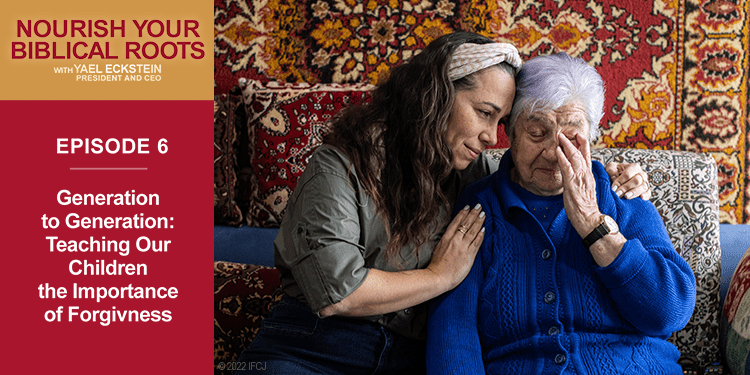Generation to Generation: Teaching Our Children the Importance of Forgiveness

One of the most difficult practices for any of us to learn is forgiveness —asking forgiveness from God, seeking forgiveness from others, and giving forgiveness. Yet this practice is so critical to living a healthy and happy life, and its rewards are invaluable. On today’s podcast, host Yael Eckstein shares how the Jewish observances of the High Holy Days — Rosh Hashanah, the Jewish New Year, and Yom Kippur, the Day of Atonement — help equip her children to both ask God for forgiveness and to seek forgiveness from others. During this intense time of spiritual reflection and repentance, Yael says her children learn the importance of saying “I’m sorry” and letting go of past hurts and offenses. As Christian theologian Billy Graham once said, “Every year during their High Holy Days, the Jewish community reminds us all of our need for repentance and forgiveness” Listen today!
Episode Notes:
The most sacred time on the Jewish calendar is known as the High Holidays, or the High Holy Days, which begin with Rosh Hashanah – literally, the “Head of the Year” and commonly referred to as the Jewish New Year – and culminate on Yom Kippur, the Day of Atonement. The two holidays are connected by the days between them, known as the Ten Days of Repentance.
As Yael Eckstein, President and CEO of the International Fellowship of Christians and Jews, explains, “This is a time of intense introspection, self-reflection, and repentance that lead to asking forgiveness from God and also seeking forgiveness from those whom we have hurt or offended — whether intentionally or unintentionally — throughout the year. It is a time we can chart a new course and begin the year with a clean slate.”
The High Holy Days are a delicate balance between feasting and fasting, repenting and rejoicing. According to Jewish tradition, Rosh Hashanah is a day of judgment when God takes a close look at every person – his or her deeds, misdeeds, their heart, and their truest intentions – and makes an assessment. It’s a yearly spiritual checkup for the Jewish people.
The theme of introspection, repentance, and forgiveness continues through the days between Rosh Hashanah and Yom Kippur. These days are considered an ideal time for sincere repentance, as God is said to be especially close and attentive to people’s prayers. The Ten Days of Repentance lead up to the culmination of the High Holiday season on Yom Kippur, the Day of Atonement.
The High Holy Days are an opportunity to wipe the slate clean and begin the year with new dreams, possibilities, intentions, and commitments.
As Yael said, “Having 40 days out of every year when our entire faith community focuses on asking forgiveness from God and from others has helped immeasurably in guiding my children to be comfortable with apologizing. As the New Year approaches, asking forgiveness becomes commonplace. It is common in Jewish schools that principals, teachers, and other authority figures in the lives of our children ask for forgiveness in case they inadvertently hurt a child’s feelings.
“Imagine the impact that has upon a child – seeing the adults and authorities in their lives humbly asking for forgiveness,” Yael said. “In addition, my children and their friends also exchange apologies in advance of the holidays. While the apologies may come more from a place of tradition then sincere regret, this practice trains our children to ask forgiveness and to forgive. It gives them the tools to become mature adults who are so great that they are able to humble themselves when they are wrong and make amends.”
Learn more about the High Holy Days when you visit our Learn Center.
